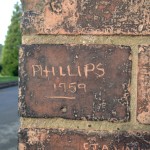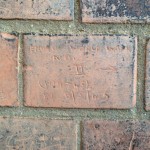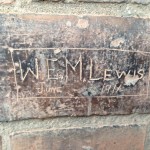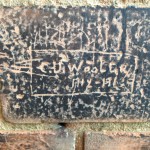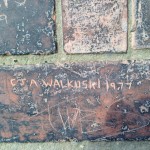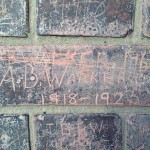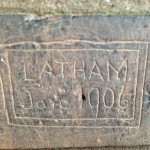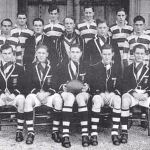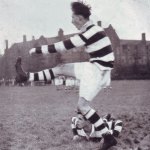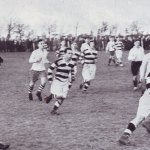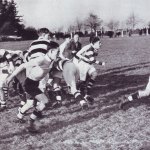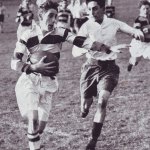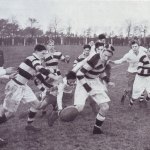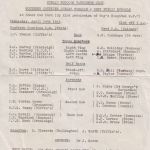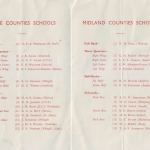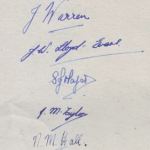Sadly, Bean is probably no longer a name not known the majority of current Worksopians. However, it is safe to say he is the original Mr Worksop College and his encyclopaedic knowledge (of all things Worksop) will never be surpassed. The College Archives were established by him and are still going today.
The following address was given by Dr I.M. Webster on Sunday 3rd May 1992.
A year ago last evening, Arthur De Millichamp Beanland, always known as ‘Bean”, died peacefully in hospital. A year ago last Sunday afternoon, I had called to see him at home, at 14, Willow Close. He was very frail, but true to form the first word he uttered – if you can call it a word – was “Whacko!” Bean came “on staff’, as he so fondly called it, at the College in the Michaelmas Term of 1934. My first encounter with him was in my first term, the Summer Term of 1938. As a prep boy (the Prep then occupying the now Portland House), I found myself in the Boy Scouts – I was a Cuckoo – and one of the Scoutmasters was Bean. His enthusiasm was boundless, as it was for everything he undertook. He would charge round saying “Whacko, chaps, rally!” to me. He had been instrumental in building a brick and concrete frying top and oven on the South Field, his culinary specialities being Lancashire hot pot and pancakes.
He became Housemaster of Mountgarret in the Lent Term of 1939, and I joined the House in the Michaelmas Term of that year, three weeks after the outbreak of the Second World war. On the second Saturday of that term there was a 1st XV rugger match – one of those headed ‘the school will watch’. At lunchtime, he said to me and the other ex-Prep boy to join Mountgarret: “Why don’t you cut along to my study after the match for a dish of tea?” The two of us waited on the landing outside Mountgarret Dormitory, and I remember saying to the other boy: “What is a dish of tea?”, “I don’t know,” he said. “Perhaps you drink it out of the saucer.” Bean came charging up those stone stairs and unlocked the door of his study. There was a roll-top desk on the right-hand side, a coal fire burning, four easy chairs with all the horsehair stuffing falling out and, above the mantelpiece, a car steering wheel; and underneath that, askew on a piece of string, was a car number plate: WN 2733. You could hardly call it a study; it was more of a den, or a pit. We put a kettle on the hob in front of the fire. (Electric kettles hadn’t been invented.) He sawed up two loaves of bread, (this was long before sliced bread had been invented), and told us both to start toasting. (Electric toasters hadn’t been invented either.) The kettle eventually boiled and he produced three mugs of hot, sweet tea. To my amazement, he compounded two tins of sardines in olive oil with a pestle and mortar and added that to a jar of Robertson’s strawberry jam. This we applied liberally to our buttered toast. I suppose you would call it a Mountgarret Gentleman’s Relish. I have to confess, I never became addicted to it, nor have I sampled it since, but at the time it was a schoolboy’s dream. I also recall being told by Bean to collect some papers from his bedroom on the landing outside the House, opposite his study. I opened the door, switched on the light: what was there? One uncomfortable school bed, a chest of drawers, a wardrobe and a wash basin. But it was the light switch that intrigued me. It was a brass contraption, which looked like an old-fashioned bicycle bell, and from it a knob stuck out. Round the knob was tied a long piece of string, which went up to a hook or an eye on the ceiling then turned at right-angles to go over the wardrobe to the other corner, back over the window, then at right-angles back over the bed and then down by the side of it. The object of the exercise was that Bean could switch the light off without getting out of bed. Such was the expertise with Mediaeval technology which a single Housemaster required before the war.One evening in the dormitory in the Summer Term, we were listening to the nine o’clock news. The House wireless was in Bean’s study. It w as so ancient, it must have been one of Marco Polo’s prototypes, just superseding the cat’s whisker. An extension loudspeaker hung in the dormitory and the House listened to the newly appointed Prime Minister Winston Churchill after the ignominious defeat of the BEF in France and the miraculous evacuation of a quarter of a million men from Dunkirk. It was one of Churchill’s greatest speeches: “We shall fight you on the beaches. We shall never surrender.” This is a broadcast I shall never forget. As a fourteen-year-old, one wondered whether or not you were going to spend the rest of your life in subjugation. To cheer up our rather depressed spirits, Bean decided to put on a 78 record. It was Flanagan & Allen, singing ‘Run, Rabbit, Run’.
Wedding bells rang in 1941, and Beryl arrived on the scene. The House was transformed by her gentle and kindly touch. The steering- wheel and WN 2733 disappeared from the study and Beryl and Bean were installed in a sitting-cum-dining room above the Mountgarret landing and next to the Mountgarret common room, where seniors were entertained to dinner, be it bangers and mash or toad-in-the-hole. For very senior boys there was a glass of cider, but certainly not Mountgarret’s Gentleman’s Relish. Beryl produced, in my time, three very successful House plays, and she continued to do so until they retired from the House in 1956. Bean, of course, was by no means idle during the immense impact that Beryl made on the house. The Scout Troop, which had started to ‘dig for victory’ in 1940, was disbanded, and Bean became Master i/c Fire Brigade. Two boys from each House, making a total of twelve, went on regular fire drill, squirting water through enormous hoses. I can confirm this, because I was one of the Mountgarret representatives. One night in the Lent term of, I think, 1942, someone had forgotten to put any water in the gas heater radiators in the wooden gymnasium where the Churchill Hall now stands. But by the time the School Fire Brigade arrived, it was too late. In any case, the fire hydrants were frozen solid, and there was six inches of snow on the ground. Bean counted up his troops and discovered that only eleven were present. “Whacko!” he said. “Where’s Joss?” A wry smile came over the face of the other Mason representative, who said: “As a matter of fact, Sir, he’s in Shirley dorm, fire-watching.” I have to explain that two senior boys slept in Shirley dorm each night and would be woken by a porter in the event of an air-raid to parade up and down the South Front looking for incendiaries. No one had thought to tell Joss that the gymnasium was no more. In addition to this, the L.D.V. (Local Defence Volunteer) were converted into the Home Guard, and in my last year at School Sgt. Beanland’s section would attack L/Cpl Webster’s section after Chapel on Sunday morning. Stumps were drawn promptly at 12.30. Dad’s Army had nothing on us.
As well as all this extra activity, Bean still had to run an efficient House, and in addition he was Head of Physics and eventually Head of Science. Physics, unless you are a physicist, is, for most boys, an unfathomable subject, and for three years in the VI he drilled into me such topics as properties of matter, heat, light and sound, and electricity and magnetism, which included unravelling the mysteries of a contraption known as a Wheatstone bridge, which looked like Harry Lime’s zither. You didn’t know whether to play it or measure resistance by it. Many years later, I had to confess to him that all that knowledge he had imparted into me had been not the slightest bit of use to me in later life. “Never mind,” he said. “It made you think.” When it came to sporting activities, Bean was a terror on the squash court, and those who played him never forgot it. A master of the drop-shot, his incredible service would leave you grovelling in the backhand corner, thinking you needed a shovel rather than a racquet. I must have played him four or five times a term for five years, and the number of games – not matches – I took off him can be counted on the fingers of one hand. After a match, he would produce a dog-end from his blazer pocket, light it with a lighter that I swear was fuelled by Diesel, cough furiously and wander back with you to the changing-room. He promoted tennis; not a recognised team game during the war. He would organise a tournament where you drew lots for partners, an over-15 and an under-15. In my penultimate Summer Term, my partner and I were defeated in the final. There was a sixpenny sweep (old pence) and we went to his study to collect our winnings. My share was six old shillings, and with great seriousness he said: “Whacko! Must keep quiet about this, otherwise you could lose your amateur status.” Such was the honesty of the man.
For all the indignities that I had suffered on the squash court, I did in the end manage to redress the balance. He came in at Number 11 for the MCR cricket team, and I was bowling. I thought to myself: “Right, Master Beanland, I’m going to give you a hard time.” In the event, the first ball was perfect, just short of a good length, and Bean was not sure whether to come down the wicket or not, and was caught between Dan and Beersheba. He looked back at his wicket, which was by now in considerable disarray, and then looked back at me with that great smile on his face and said: “I think that was rather unkind.”.
He was Housemaster of Mountgarret for seventeen years until 1956. During my five years under his housemastership – in a school which in those days seemed to rely heavily on corporal punishment, when boy was allowed to beat boy – I never knew him to use the cane. I don’t think he ever did. He didn’t need to. He led by example. I left Worksop in 1944 and went to medical school. Had it not been for Bean, I would not have got there, for he had taught me to apply to the best advantage my very limited intellectual powers. There was a gap of some ten to twelve years, and apart from playing for the occasional Old Boys’ team and having a chat with him, we went our separate ways. However, having turned up to three consecutive Old Boys’ Dinners (Bean was O.W. Secretary) I found myself on the Society’s committee. My first notification from Bean was “Dear Webster” , signed “ A. de M. Beanland ”; then it was “ Mr dear Webster”, signed A. de M.B.” finally “Mr dear Ian” signed “Bean”. It was at that moment that I realised that the enormous gap which then existed between Master and boy had at last been breached. It was after my second stint on the committee that I became the first OW from Bean’s Housemastership of Mountgarret to become Chairman.
He went to great pains to write to every member of the House of 1943/44 to invite them to preprandial libation before the annual dinner. He must have done a lot of cajoling, because ten turned up, including Bill Rhodes, who has read this afternoon’s lesson. It was after this that Beryl and Beanland and Mary and Ian Webster met fairly frequently for lunch or dinner at No. 5, East Field or at our home in Ashby-de-la-Zouche. It was only then that I discovered his fluency in French and his passion for Napoleonic memorabilia. He even went into print, publishing ‘Motoring in France’, ‘A Fortnight Camping in France’ – one might have known about this ability. In 1946 he published the Mountgarret Jubilee Book and in 1955 he edited the College’s Jubilee Book 1895-1955, both of which demonstrated his incredible attention to detail. As O.W. Secretary, he again demonstrated his extraordinary memory. When an Old Boy was nominated for the committee, he would invariably know his name, his initials, his House and, very accurately, his years at the College. His labour of love was a small collection of O.W. memorabilia, which was housed originally under the eaves of, I think, the South wing. This is now in the Edmund Beanland Room, which is opposite the Lady Chapel.
The social lunches and dinners between Beryl and Bean and Mary and Ian Webster came to an end with Beryl’s long suffering from Alzheimer’s disease. It lasted a long time. I recall that in 1974, when Bean retired from the staff and a number of old Mountgarret boys organised a farewell party and a presentation to him in the Churchill Hall, sadly, Beryl wasn’t there. She died in 1979. The only task that Bean undertook on behalf of the School which he did not enjoy was when he was appointed Second Master. I don’t think he wanted the post, he certainly didn’t like it and furthermore it made him ill. So he asked to be relieved of that post. This rather sad affair possibly promoted the great one-liner about himself. “Schoolmasters,” he said, “are not men among children, but children among men.” He trotted this out over lunch at Ashby-de-la-Zouche. I have dined out on the story, but I don’t believe it. Generations of Worksopians will make their own assessment of Arthur de Millichamp Beanland. For my generation, and for me in particular, Bean’s footsteps will forever walk those lonely cloisters – the lonely cloisters of Worksop College – Worksop College whose servant he was, and which he served in such a multiplicity of disciplines with such distinction for upwards of half a century.A child among men indeed. He was man’s man, a man for all seasons, and this afternoon we salute that memory.


